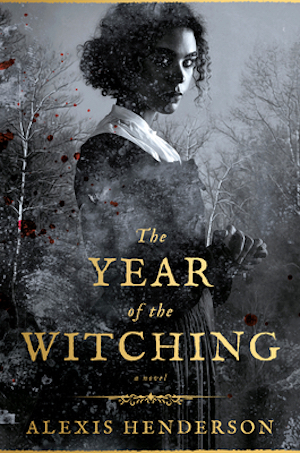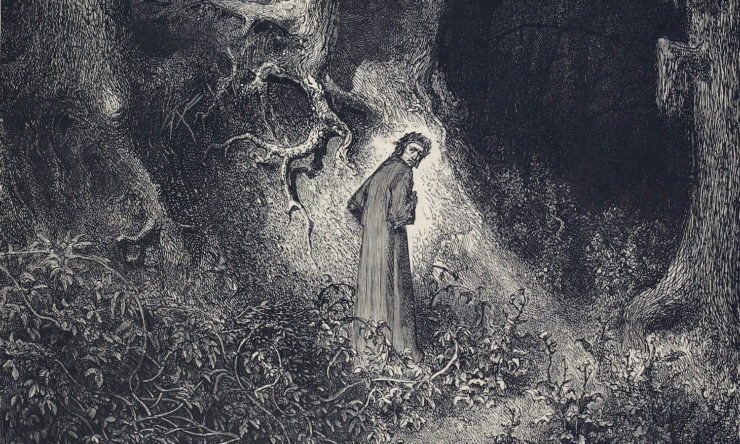Almost all of us harbor an innate and powerful fear of nature. Much of our anxiety is rooted in logic, the wild is, after all, dangerous and unknowable. But there are inexplicable instincts coded into our psyche that seem more rooted in myth than reality. At night, when we peer out our windows into the waiting dark, we fear a faceless evil, and while we don’t know its nature or that of the wilderness that harbors it, we dread it just the same.
These instinctual anxieties toward nature manifest in much of the literary canon—from fairytales like Red Riding Hood, which warn of the dangers of the woodland wilderness, to early texts like Dante’s Inferno, which crafts a powerful parallel between natural bodies and the underworld in its opening lines:
Midway upon the journey of our life
I found myself within a forest dark,
For the straightforward pathway had been lost.Ah me! how hard a thing it is to say
What was this forest savage, rough, and stern,
Which in the very thought renews the fear.So bitter is it, death is little more;
But of the good to treat, which there I found,
Speak will I of the other things I saw there. (Inferno, Canto I)
These hellish portrayals of the wild have helped to establish the stark dualism between man and nature, where the former embodies all that is orderly and virtuous, and the latter carnality and vice. Because of this dynamic, the tension between civilized and wild, known and unknown, adopts a moral significance wherein the world of man is likened to virtue and safety, and the wilderness is made synonymous with chaos, danger, and evil. Thus, fully aligning oneself with the wilderness is, in essence, an act of betrayal against the “goodness” of one’s own human nature.
In that sense, the wilderness poses a threat to our humanity. Instead of living in congruence with our environment, we divorce ourselves from it entirely and attach our identity as human beings to the concept of the “civilized.” Everything we deem good and right, we associate with our enlightenment. And the parts of ourselves we are reluctant, if not unable, to accept—our rage and our violence, our capacity for evil—these vices we align with the uncivilized, the feral, the stark and often frightening, enigma of the wild.
In her acclaimed trilogy, The Broken Earth, NK Jemisin explores this inherent tension between man and earth. Jemisin creates a planet racked by cataclysmic seismic events. In this fraught world, there are regular human beings called “stills” and orogenes—people cursed with the ability to both trigger and quell seismic catastrophes. Because of their close association with the “evil” Father Earth, orogenes are loathed, dubbed pariahs and traitors to humankind. In turn, Father Earth hates men, both still and orogene alike for exploiting him:
He [Father Earth] did not create life—that was happenstance—but he was pleased and fascinated by it, and proud to nurture such strange wild beauty upon his surface. Then people began to do horrible things to Father Earth. They poisoned waters beyond even his ability to cleanse, and killed much of the other life that lived on his surface. They drilled through the crust of his skin, past the blood of his mantle, to get at the sweet marrow of his bones. (NK Jemisin, The Fifth Season)
This passage is a deft portrayal of the innate and seemingly mutual, loathing between man and earth. Within the context of this dynamic, Jemisin examines the darkness that is inherent to our understanding of nature, exploring it through a lens of mutual loathing that extends from earth to man and man to earth in an exploitative, if not parasitic, exchange.
Jeff VanderMeer explores similar tensions in his critically acclaimed science fiction novel, Annihilation. The story follows an expedition of four women tasked with uncovering the source behind a deadly and mysterious Area X, a lush tropical landscape infected by an unnamed, unidentifiable, alien presence. During their mission, the expedition encounters a violent and sinister entity known only as the Crawler. Part man part other, the Crawler is a symbol of man and the chaos of nature made one. The Crawler does not speak. Does not emote. Does not betray any semblance of humanity apart from the words that it writes, in rambling passages scrawled across the walls of a tunnel in a kind of fungal ink:
The shadows of the abyss are like the petals of a monstrous flower that shall blossom within the skull and expand the mind beyond what any man can bear, but whether it decays under the earth or above on green fields, or out to sea or in the very air, all shall come to revelation, and to revel, in the knowledge of the strangling fruit—and the hand of the sinner shall rejoice, for there is no sin in shadow or in light that the seeds of the dead cannot forgive. And there shall be in the planting in the shadows a grace and a mercy from which shall blossom dark flowers, and their teeth shall devour and sustain and herald the passing of an age. That which dies shall still know life in death for all that decays is not forgotten and reanimated it shall walk the world in the bliss of not-knowing. And then there shall be a fire that knows the naming of you, and in the presence of the strangling fruit, its dark flame shall acquire every part of you that remains. (Jeff VanderMeer, Annihilation)
The Crawler’s passage is, at once, a depiction of death and horrific recreation. It functions as a compelling expression of our most fundamental fear: nature’s capacity to remake, or perhaps more aptly unmake, us. Because our anxieties toward and about the wild aren’t rooted in fear of the wilderness itself, but rather fear of our own capacity for brutality and evil. In that way, dwelling with the wild undermines and even dismantles the fragile illusion of our civility and sense of control, forcing us to accept the darkness that is inherent to our own human nature.
To avoid this grim truth, we project our vices onto nature and distance ourselves from what we cannot accept. We don’t venture into the wild beyond the road’s end. We don’t allow ourselves to dwell in the darkness of the unnamed and unknown. We keep to the paths well-traveled, lock our doors at night and draw the curtains over the windows so that only a little moonlight leaks in. We learn to school ourselves in distraction and denial.
Perhaps then, our fear of the wild unknown is simply an effort to tame ourselves, to contain the feral parts of our nature that we attempt to quell with the delicate trappings of the “civilized.” Because, in the absence of those trappings, we’re forced to confront the fact that the darkness we fear most is that within ourselves.
 Alexis Henderson is a speculative fiction writer with a penchant for dark fantasy, witchcraft, and cosmic horror. She grew up in one of America’s most haunted cities, Savannah, Georgia, which instilled in her a life-long love of ghost stories. Currently, Alexis resides in the sun-soaked marshland of Charleston, South Carolina. Her book, The Year of the Witching, will be available on July 21, 2020 from Ace Books.
Alexis Henderson is a speculative fiction writer with a penchant for dark fantasy, witchcraft, and cosmic horror. She grew up in one of America’s most haunted cities, Savannah, Georgia, which instilled in her a life-long love of ghost stories. Currently, Alexis resides in the sun-soaked marshland of Charleston, South Carolina. Her book, The Year of the Witching, will be available on July 21, 2020 from Ace Books.










